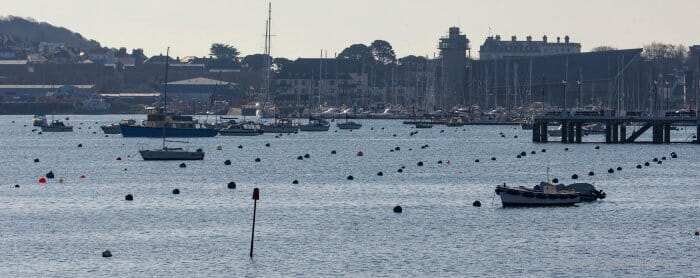
The view from my office window across Falmouth roads reflects the seasons. On fine summer days it’s a bustling place, boats everywhere, alive with sails, vibrant with activity. In winter the mooring fields empty, and only the occasional fishing boat or ferry catches the eye, lending an air of desolation to the harbour. So, as you can imagine, all of us lucky enough to live here warmly anticipate the arrival of spring as the time when, once again, the town will come alive.
The sunny weather over the last fortnight that warmed our skins told us that winter is over, but the evidence we can see out on the water tells us a very different story. The mooring fields are all but empty and no sails criss-cross the harbour—no great surprise because, along with the rest of the country, Covid-19 has cast its shadow over Falmouth.
That Was Then
In a normal year, the last few weeks would have seen a frenzy of activity in the boatyards. Travel hoists would have been working full time dropping newly antifouled hulls into the water. By this time, at least half the moorings would be occupied, ready for the long Easter weekend and the start of the season proper. But everything is in lockdown, so the travel hoists remain silent and the boatyards are still full to capacity with stored boats.
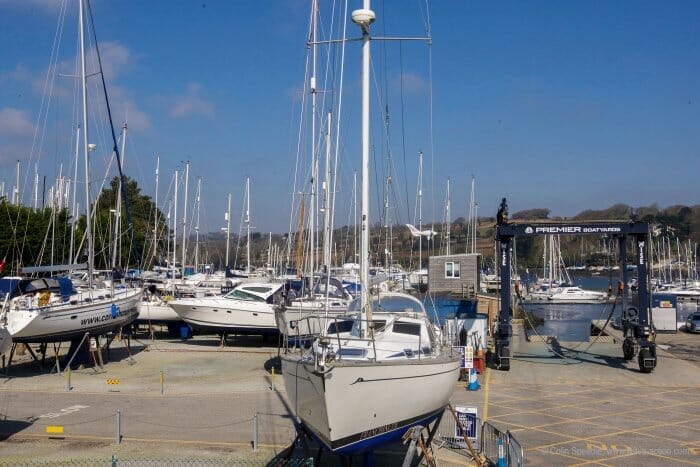
Falmouth largely revolves around sailing and other related maritime activities. There can be few places around Britain with a greater density of boat owners, or with a local economy that is so indivisibly linked to sailing. Literally hundreds of jobs depend on this narrow but economically important sector. So the current collapse of business cannot help but have a devastating effect on the town.
This is Now
Boatyards, chandleries, marinas, riggers, engineers, electricians, sailmakers and many other associated businesses are all suffering, just when they should be at their busiest.
Only a few months ago, no-one was predicting any more than a possible slowdown in business activity, with time to allow businesses to prepare strategies to mitigate that impact. The reality has instead been a sudden and almost total halt to spending that has left the men and women working in the marine industry shell-shocked and worried for their long-term future.
No-one knows when the yards will be working once again, or whether even then many owners may elect not to launch their boats, at least while there remains the possibility that personal lockdowns may have to be reintroduced in the event of a second wave of infection. Why would you, when it’s cheaper to keep the boat on the hard, and when, in any case, you have no idea when you may be in a position to use it?
The general lockdown of business across the country means that almost all households are watching their finances very carefully indeed and ‘discretionary spending’ on leisure activities such as sailing must surely be near the top of the list of items to restrict.
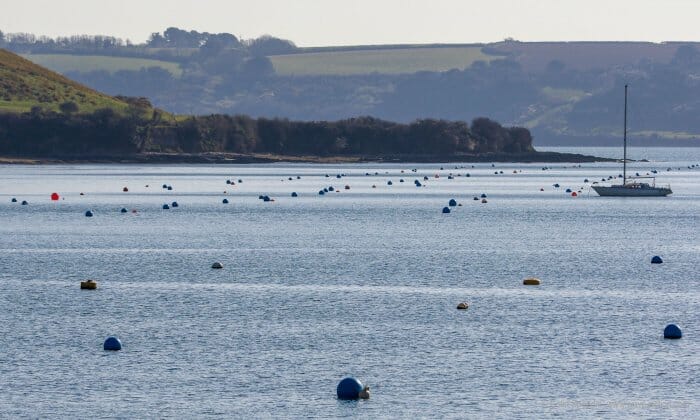
Staying at home or self-distancing means that few out-of-town boat owners will be down here for some time, and even if they did turn up they might not be welcomed with open arms:
- Some marinas are reported to have informed berth holders that they are not permitted to use their boats as a second home in which to self-isolate until the lockdown is lifted.
- In scenic but sparsely populated regions all around the country, visitors in general, especially from the cities the epidemic is currently centred in, are being actively advised to stay away.
This might seem self-defeating in regions that rely on visitors as the backbone of the local economy, but there are good reasons for this advice. Not only are possible carriers of the virus best advised to stay home and not help to spread it anywhere, but many of their favourite areas are remote with limited medical facilities. Unless we can get a grip on this pandemic, our inadequate services may soon be overwhelmed by the needs of the winter population, let alone an influx of extra patients from outside the area.
Into The Unknown
Currently we have no idea when things will return to some semblance of normality (whatever that may turn out to be). None of us have seen anything like this in our lifetimes. So for now, the sailing season for 2020 is very definitely on hold, and we can only hope for some magic bullet that will alleviate the collective suffering of the people and businesses here in this sailing hub, so badly affected by this awful turn for the worse, and soon.
This Season Will Be Different
So spare a thought for the people working in the ‘yachting industry’, the men and women who have built businesses and careers running the likes of sailing schools and charter yachts right up to trans-Atlantic and polar craft.
Here in the northern hemisphere, the final preparations for the season would be just about complete, all of the hard cold winter’s graft servicing and re-fitting the boat behind them at last.
When the boat finally splashes it’s a big morale boost for the crews, psyching them up to deal with the inevitable last-minute issues great and small. Anticipation of good times, fine people, and wonderful experiences runs at an all-time high at this time. Which is just as well, because most of the people involved do it for the love of the way of life, not the money, for there’s not a lot of money in it, let me assure you.
So seeing some of the well-known names of the fleet still tied up, the gear lying idle on deck, is saddening indeed. Not only because some of the crews are friends of ours, but also because I was in their shoes for so many years, as a working charter skipper, which is a far more emotionally charged job than you might at first imagine.
The skipper and crew have to run the daily gamut of chores and worries, all the while hoping to share some transcendent experiences with the eager adventurers in our care, some vivid memory to guide them through until next year. Not least because many of them will be friends from previous voyages, who return for their annual fix of adrenaline and wild places in our company.
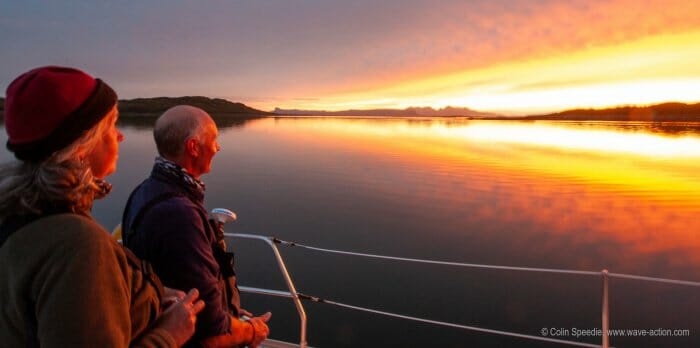
So, beyond the financial worries that now confront the charter companies and their owners, I can hardly bear to imagine what it must have been like telling the charterers the bad news, those people who have been living for their two weeks afloat with you. As Yeats said, tread carefully, for ‘you tread on my dreams’—and in this case, your own, too.
The Few Remaining Craftspeople
I have always held people with real mechanical skills in the highest regard and tried my own cack-handed best to emulate them. I’ve also counted myself very lucky to have known and been on good terms with some of the most able and unsung of these heroes, not least my old friend Martin Taylor of TRG Engineering in Falmouth.
For all the years I have lived and sailed from here, Martin has been my ‘go-to’ guy, and his endless good will and engineering genius has saved my bacon on many an occasion. Like the time I arrived in his workshop with the mangled windlass stripper arm off a brand new Boréal on delivery to Ireland. Without this insignificant but vital item we weren’t going anywhere, but within ten minutes Martin had made the horribly twisted item better than new and we were once more ready to go.
On other occasions I have arrived with no more than a sketch and a few vague ideas, which Martin has translated into something approaching perfect form, better than I could ever have hoped for, which to me is nothing less than alchemy.
But there’s a twist. Martin is now seventy years old, and after a lifetime of hard work simply wants to retire. When he does, there is currently no-one local with anything like the breadth of his skills, range of machinery, and treasure trove of engineering lore.
Give the younger generations of engineers a CNC lathe and an order for 100 items to an exact specification and they can do a great job. But ask them to ‘imagineer’ and fabricate an item from scratch, pick the optimal material, machine it, weld it and then make it presentable, and they are lost. And engineering shops generally don’t want one-off, tricky jobs these days, because it’s almost impossible to charge a fair rate and make money, removing yet another incentive to develop a wider skill set.
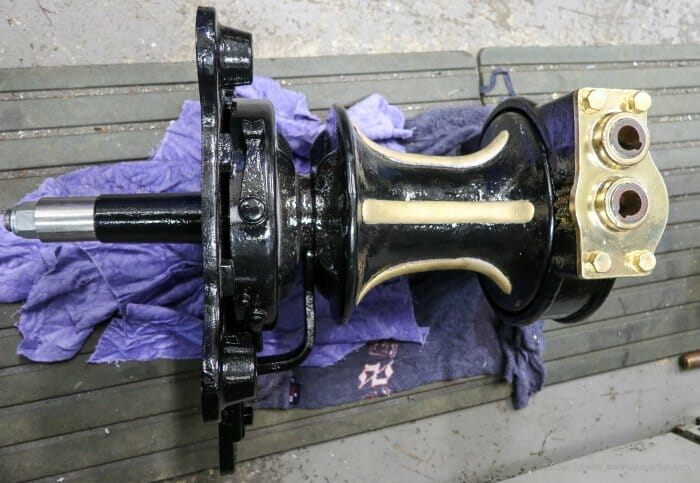
When I visited him the other day (while that was still permitted!) Martin showed me a 100-year-old capstan-type windlass that he had just completely restored for the owner of a Bristol Channel Pilot Cutter. Typical of his meticulous craftsmanship, the internals are as solid as the exterior is spotless and it will add function as well as form to the foredeck of what will eventually be a magnificently restored historic craft.
Martin organised and carried out the whole job himself. I don’t know of anyone else who could have turned out such a fine piece of work. What we will do when he finally is as good as his word and retires, I do not know.
There’s still a Martin in most working ports, capable, helpful and skilful, beloved of all the locals who rely upon him. Maybe you know one. What worries me is that the current downturn may be the final blow that forces those final few to shut up shop for good. Maybe if we respected these old-school heroes more and accepted that their time was worth paying for—properly and on time—that might help.
Otherwise, the next time we need someone to fabricate some ‘no longer listed’ part, or make some ingenious one-off item in unobtanium, there will be no-one to turn to. And that will undoubtedly leave us all the poorer.
The People Who Rely On Us
Long-distance cruisers are largely freed from the tyranny of timetables. It’s a huge privilege that (amongst other things) allows us an opportunity to become short-term members of island communities.
We might be ocean nomads, but we generally like to engage with local people and get a real feel for a place. Yet sometimes I wonder whether we recognise just how much we have become ‘part of the furniture’ in many parts of the world, and just how much that relationship is symbiotic, socially and economically. Which begs the question of whether, or how much, we will be missed if we don’t turn up in the usual haunts this season.
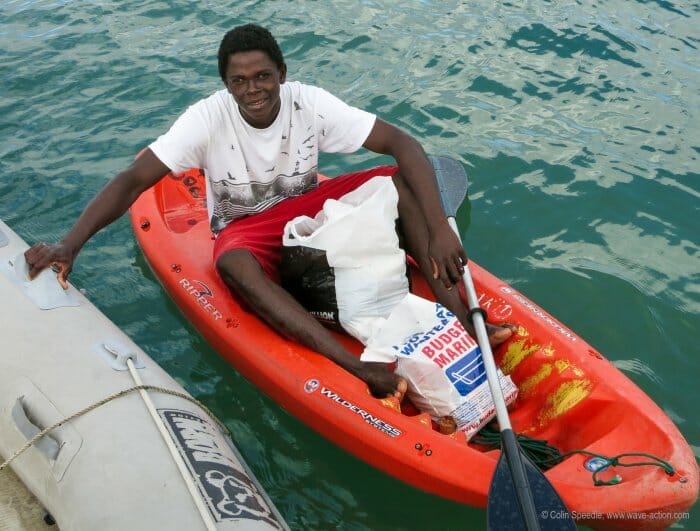
In some places such as the Caribbean, there would certainly be a noticeable economic downturn as a result. This would not only be felt in the marinas, restaurants and supermarkets of the more developed islands like Antigua, but even (maybe more so) in the chicken shacks and rum shops of the more rustic islands like Carriacou, right down to the laundry launch and boat-based fruit sellers. When your daily income is measured in small numbers of dollars, the loss of even a few will have a major impact.
The People We Won’t Meet
In other less-frequented places, where cruisers still remain something of a novelty, there may be a less obvious loss, that of the simple human contact that both parties (cruisers and landsmen) so obviously enjoy and value.
The last place we were in where this was most noticeable was Newfoundland, especially in the isolated outport at Francois, where the warmth and curiosity of the locals was obvious (and very welcome) to the crews of all the boats alongside the tiny pontoon.
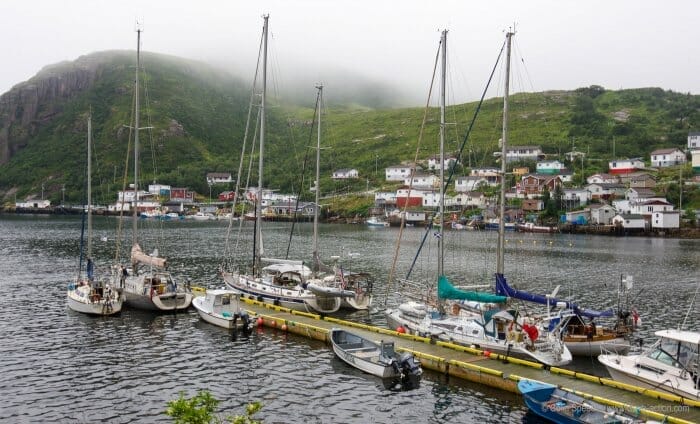
Since time immemorial the exchange of ideas and cultural values has spurred people to travel the world, often in the face of bad weather and discomfort. I don’t think that it is fanciful to argue that this atavistic urge is especially true for those of us able to access these wonderful places and people. It’s one of the main reasons why we go cruising, and I don’t think there is any reason to imagine that for the locals that contact is any less important.
So wherever we are wont to sail, if we don’t visit we will be missed.
We’re All In This Together, But…
None of these concerns are existential. There’s a world out there beyond our own with far more urgent realities. Whether we go sailing or not in 2020 is a first-world concern. Some of us will undoubtedly lose loved ones, given the odds on this indiscriminate plague. Nothing compares to that. The priority is to defeat this virus, whatever it takes.
But There Is a Future
But while that is underway and we’re locked up in our dwelling, we have time to reflect on what we’ll miss, and what that in turn will mean to others. And perhaps to dream of new horizons, people and places that we’ll look forward to seeing one day soon. One day this, too, will be behind us and it will be time to turn dreams into reality once more.
People are already talking as if this season is written off. Nobody can say this for sure. Who knows, things may yet take a turn for the better. Let’s fervently hope so. It’s a definite possibility, though, that things may never be the same. Personally, I hope that our community survives, above all.
Which includes us and all of the people mentioned above. Because, whether we realise it or not, we have become a huge, interlinked community, and it is a good one. Let’s do all we can to remember that, support each other through this current difficult time, and keep that flame alive.
Further Reading
For those looking for a distraction from the current situation as well as a reminder of how wonderful voyaging can be, told as only Colin can:

Hi Colin,
wonderfully written and so true. Especially the part about the guy-to-go-to. There is one in my baltic home port and he’s “saved my bacon” plenty of times. But the really good news is that his son recently started to take over and he is of the same spirit and his level of skills almost matches his father’s.
Here in Germany we just got the news, that boats will be permitted to get launched from May 4th. Gives me something to live for. No, really, you are right about this being a first world concern, but still… Looking forward to my first pint in the Falmouth Chain Locker.
Best regards, Hans
Hi Hans Hinrich
as I remarked in the post – we all have our ‘go-to’ guy, and, like us, age is creeping up on them, too.
So it’s great news to hear of a son taking over from a father with all that depth of insight and skill to go somewhere where it will prove invaluable. A cascade of hard-won knowledge from a lifetime of learning, if you like. Maybe there’s hope yet!
Good to hear of boats launching, too, and I’m sure everyone here is aching for the day we can safely do so, too. When we can buy you a beer in the Chain Locker, too!
Best wishes
Colin
Lovely article Colin, I think we should all (if we can afford it) take a few bucks down to your local ” go to guy” and tell him this money is for the times he did not charge you for his information and experience that he took 40 years to learn…I would bet he will appreciate it. These guys are priceless and certainly not enough of them. Some have to be hurting in this virus era.
Gary Doyle
Hi Gary,
I think that’s a great idea. Apart from being altruistic, we can also see it as self interest. Not only do we make it more likely he’ll still be around to help us. It’s also like tipping the waiter handsomely at the moment we sit down at the table, rather than when we leave. If we then treat them as our equals, not our paid servants, we’ll get honestly felt smiles, friendliness and helpfulness, rather than the standard.
We could give our harbour guy a noticeable amount, like more than a hundred. He will in the future remember us with a smile and treat us as priority customers. Visiting him for a chat or with a task will be a pleasure making boating better.
As you suggest, we should make it clear that it’s for services he has already given us. He owes us nothing. Also not thankfulness. The money was an overdue payment. If this isn’t emphasised and honestly meant, the action of kindness can hurt pride and backfire. In my experience, some of these harbour geniuses might be a bit socially awkward, so they could backfire from situations that are not clear cut.
So, the money is not payment for future jobs, not tips, not a gift and certainly not welfare. It’s payment for what he has already done for you without putting it on the bill. The best is if we can even specify some actual examples when, in your experience, he did just that.
Hi Gary and Stein
great idea – and as Stein suggests, if done right might raise spirits when times are tough.
As much as anything, though, what might work wonders would be more simple respect for others for the many things that they can do (that we can’t) and their time. I’ve watched in amazement some times when people, who are clearly well-heeled, quibble over a bill that would take them maybe five minutes to earn….
Best wishes
Colin
Beautifully written, insightful food for thought.
Beautifully, valuably, and appropriately said.
Hi Jacob and Robert
then it was well worth writing – thank you.
Best wishes
Colin
Thank you for this!
If weather permits, I will be happy to contribute to the re-starting of the local economy in a very modest way, by buying a few pints and snacks in Cornwall or the Scillies, in the second week of June (and hopefully not by looking for the go-to guy of the harbour!!). Of course it’s too early to know what the situation will be, but do you have some information, or some source of information to check, regarding the measures taken in the Scillies, and how welcome visitors might be?
Hi Maxime
I have no idea ta all what the situation may be by then and I’ll bet no-one else does either!
Places like the Isles of Scilly, the Hebrides and the remote Irish islands are probably some of the safest places to be – as long as the virus doesn’t make it ashore. I fear it may be some time (and many assurances from scientists and motors) before they will feel safe to welcome visitors, which is a desperate shame, and is not, of course, the usual way of things. One day this will be behind us, though, and I’m sure they will welcome you ashore – as always.
Best wishes
Colin
Interesting thoughts Colin. I think the current situation has just highlighted the aspects that you mention rather than be a potential cause of their decline, although it will have been an accelerant for sure.
In the early 1990s the father of a friend was helping his son restore an old wooden motor boat. He was about 80, the son about 50. The father was an ex boat builder from Millers of Fife. He was the last of that skill in Fife and now it is all gone. Fast forward to 2017/18. I engaged the services of a boat builder based at Lochgilphead to finish the interior of my boat as the refit was dragging on. The boat builder had two employees who worked with him and they worked wood to a high degree of skill. They are now over in Fife refitting an old Fifer, prior to that in Crinan fitting planks to a fishing boat hull while the boat was still afloat. My own 1973 windlass was rebuilt mostly by me but the engineering work was carried out at Glasgow machine shop, the motor rewound in Darby, the cast body resprayed in a local automotive shop. These services are all around us, young people have learned trades, and businesses exist to work stuff and refurbish. A friend, drilling engineer, has joined a local charity that is refurbishing a steam locomotive where there is a wide range of skills from the local community. I would not be so despondent on skills disappearing, there is always somebody learning stuff as necessity decides, hence the rise of refurbishment videos and organisations that can undertake such work, heck it’s even made it to popular TV.
I think there has been tension building in remote places for a long time based on the inequality gap with serious crime just around the corner in many places and a frisson that this can’t be what life is all about. I do not know where this will go but it has never been so obvious how poor some people are living right next to staggering wealth. The current situation may just be the start of a demand for a better life, beyond servicing the wealthy just to scrape enough to live on.
The environment is changing and that is forecast to be a far bigger calamity than what is being faced in these communities, and probably for all of us, whatever the cause of global warming. The virus may show up just how polluting we have become by the drop in pollutants and the refreshed visibility of nature. I have spotted so much wildlife and can hear it all around me. Think of this, it has taken a virus for the world to respond quickly, cohesively and decisively (or at least attempting to). Yet on the environment, a far bigger issue, we don’t feel the need to act as quickly. That’s not exactly true of course, if one looks at the rise of renewable energy.
Humans are highly adaptable and quick at it. I do think that we will see a massive dent in sailing as a leisure activity exacerbated, very likely by a deep recession. Yet that may very well be the catalyst for a new generation of young, low overhead, no baggage, highly mobile, community spirited sailors that are prepared to get stuck in and help each other. It’s made me think about where my own priorities are. Just my musings!
These are my opinions and thoughts, not submitted to generate a discussion, debate or cause argument. I accept that my opinions may be wrong.
Hi Alastair,
To me, that’s just the kind of thinking we need going forward. Are all your opinions right? Who knows. The good thing is that you are thinking about it. I hope many more of us will do the same.
I too have wondered whether this might not spur a new generation of shoe string sailors much more connected to the sea, the environment, and adventure than Netflix and iPhones. Perhaps some sort of universal basic income arising from this could make that happen. I mused about that a couple of years ago: https://www.morganscloud.com/2018/02/27/two-books-that-will-help-us-go-cruising-part-2/
Hi Alistair
I’m very pleased to hear you’re finding people willing and able to do good work with their hands – I, too, hope that people will re-discover the pleasure that can bring and add to the roster of capable hands. In Cornwall, too, we have some excellent young people learning the old crafts, one of the reasons that Falmouth has become something of a Mecca for wooden ships.
I agree that we don’t prioritise the environment as we should, and I hope (!) that we can adapt in time to pass the world on to future generations for them to see and enjoy so much that has been a privilege to see for us all.
Best wishes
Colin
Thanks Colin, enjoyed your article very much. We especially enjoyed pictures of St Vincent, Francois, and Falmouth they brought back great some memories. Currently, our Maggie is locked up tight in the yard in Tropea, Italy. Pretty difficult to even guess when things will open up again. I guess we all need to safe safe and stay ready.
Hi James
memories of amazing times and places are what keep us motivated to find out what is around the next headland! Once we think we’ve seen it all, it’s time to swallow the anchor.
There are some initial signs that opening up is being considered, and indeed some places (se above re Germany) where dates are entering the diary. As you so rightly say, stay safe and ready.
Best wishes
Colin
A nicely written article thank you, and on an important theme. If nothing else this event will have made many independent minded cruisers realise just how very dependent we still are on matters onshore. We may sail off around the headland or over the horizon, but the land has it’s tentacles woven into our lives. We are visitors to the ocean, not it’s inhabitants.
As for the future; it’s very uncertain. Our ability to sail securely without too many constraints is no longer assured. We may find the world far more regionalised than we are accustomed to. Ocean passages could be off limits for many years. Entry to small nations very restrictive. We may find coastal trips the only available option. But this is not the biggest threat.
As you have already spoken to, a deep recession will also make an already expensive undertaking, simply beyond the reach of the next generation. I’ve been thinking recently that if the number of new sailors drops below some critical number, the economics of all those businesses that make our boats and equipment possible sink without much trace.
The very rough outline of an idea that I have is this; the existing generation of boat owners should be planning ways to engage the next generation into the sport. It may involve moving more toward the sharing economy, or more flexible charters, or group ownership. I realise there are drawback to all of these, but not being able to afford a boat at all is the most fatal limitation of all.
We need to be considering how to sustain the continuity of our sailing community into the future … and just as governments all around the world are responding to the COVID crisis will all manner of responses that would have been unthinkable just a few short months ago, maybe sailing needs to be thinking about radical adaption as well.
Hi Philip
I agree with so much you say. Adaptation may be the best way for us to forge a new, sustainable future.
But that need not be too much of a burden – I’m old enough to remember when clubs like the Island Cruising Club in Salcombe owned hundreds of boats from the smallest dinghies up to Brixham sailing trawlers and a beautiful gaff schooner, all sailed communally by all ages – and a lot of fun and adventures were had. I’m confident we’ll adapt.
I think the best boats will still be built and sought after, but I’m less convinced that the ‘bulk builders’ will build many boats beyond the charter fleets.
Let’s hope some good comes from all of this – for everyone’s sake. Business as usual is over, but that gives us time to imagine what we want to build to replace the old regime. Let’s use that time wisely.
Best wishes
Colin
Hi Colin,
I think you are right, a return to group ownership managed by clubs is the most likely, and best, way to keep offshore sailing going.
The CCA has been on a search for relevancy lately, producing videos and some other pretty useless stuff. I have said repeatedly to several members that, if you really want the club to be relevant, sponsor a fleet of wholesome shared ownership offshore cruising boats. Most everything else is simply a waste of time and resources. My suggestion has been pretty much universally denigrated as impractical but my guess is if the old clubs don’t do this, new organizations will arise that will, and that will make said old clubs even less relevant than they are today.
Might be something for the OCC to think about too.
Hi John
there has been long tradition of group ownership, two obvious operations being the ICC (mentioned above) and the Glenans group in France. Groups owning a single boat still exist, witness ‘Sceptre’, the last wooden America’s Cup entrant, still sailing under shared ownership. I met her and some of her owners and they were a happy bunch with a well cared for boat.
But not all such ventures end as well – poor old ‘Fazisi’ ended up on a beach in the Florida Keys.
‘Chartering’ a classic boat in this way requires the right boat and the right management structure. Anything too elderly, too fragile or too complicated is unlikely to last – one hard season chartering = 10 years of private ownership, in most informed people’s view.
There are some great boats out there that might suit, often at low purchase prices – it’s the running costs that are the issue. But if the right people could be persuaded to get behind such a project, with proper management of finances it might just work, and, as you say, introduce a whole new audience of youngsters to take upon this great pastime.
Best wishes
Colin
Hi Colin,
I agree, big challenges. That said, I’m thinking of a slightly different model than the traditional one of buying older cheap boats. Rather I think a new class of simple strong one design cruising boats is the way to solve the the ongoing costs problem. At the US boat show I was amazed at how much boat Group Beneteau were able to put in the water for comparatively little money and that’s with huge marketing costs added on. Use that marketing money to up the quality and get rid of foo foo stuff like twin wheels, and clearly said boats could be built for a sensible price, say batches of 10 boats for a million US, after a million in start up expenses. They’re are a bunch of people in these clubs who could donate that kind of money out of petty cash, time for them to put their money where their mouths are if they truly want to be relevant and save offshore sailing.
Hum, I feel a post coming on…
There’s relevance in Colin Speedie’s musing over the erosion of skills and the skilled, and of access to fine sailing once provided by the likes of the ICC at Solcombe. I recently gave my club, the Tamar River SC, a copy of this painting of ‘Hoshi’ and ‘Provident’ off Devon…. I’ve sailed on both, with priceless memories of the dolphins coming on a black night, while I was steering ‘Hoshi’, with their irridescent long trails of glitter in the black water….
I also offered my club a boat, for use by the Cadets. No interest.